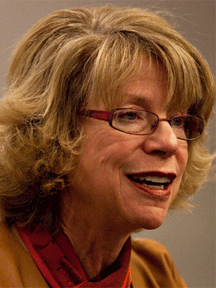By Riham Osman
Sally L. Kitch, founding director of the Institute for Humanities Research and a Regents’ Professor of Women and Gender Studies at Arizona State University was a panelist at the forum “Are We Losing Our Humanity?” held by Arizona State University, September 7, at the National Press Club in Washington, D.C. Kitch was among several panelists who spoke at the forum, including Phi Beta Kappa Secretary John Churchill.
Kitch became a member of Phi Beta Kappa at Cornell University where she received her undergraduate degree in English. Her book The Spector of Sex (State University of New York Press, 2009) was named a top-three finalist for the 2010 John Hope Franklin Award by the American Studies Association making it her third book to win national recognition. This Strange Society of Women (Ohio State University Press, 1993) won the Helen Hooven Santmyer Prize in Women’s Studies in 1992 and Chaste Liberation (University of Illinois Press, 1989) won the NWSA Book Award in 1987.
During the humanities panel discussion, Kitch had an optimistic and positive outlook on the questions addressed at the forum. Upon being asked about her viewpoints on the question “Are we losing our humanity?” she responded that when she thinks about losing she thinks of seeking and that humanity is something we seek all throughout our lives. “We lose it, but we also re-seek it. Call me an optimist, there is something on the other side of losing and the ‘re-seeking’ is what I hope that we can focus on,” said Kitch.
Kitch is currently involved in analyzing the humanities in relation to sustainability and the environment. She began to understand the humanities though a different approach as a method towards solving a problem. “One thing I now understand is how the humanities gives us the opportunity to create narratives to re-see the familiar. One of the things we say in the women and gender field is that we make the familiar strange,” said Kitch.
At the forum, she learned from the views expressed by the other panelists as well as the audience members. Kitch said that she was heartened by how many people in the audience were devoted to preserving the humanities and felt from the participants in the forum that there was a deep commitment to the humanities.
The Institute for Humanities Research was founded by Kitch in 2005 and has funded many projects since then. The institute’s mission is to promote humanities based research, socially engaged research, and collaborative research as well as to co-fund faculty research projects and develop an intellectual climate for research on campus. “The role of the Institute for Humanities Research in the New American University is to advance the humanities as a site of vital research that contributes to productive social dialogue and makes a difference in the world,” said Kitch.
One of the latest initiatives of the Institute for Humanities Research is the “Just Food: Culture, Health, and Rights” project. The multi-year transdisciplinary project looks at food from a humanities point of view and is a way of having a cultural understanding of food. The “Just Food” project is devised to research moral and cultural questions linked to modern food production and consumption. Kitch hopes that the project will have an international influence relating to food and ethics.
Kitch recently completed a book manuscript about the lives of two Afghani women and the historical and political situation in Afghanistan. Her new book titled Afghan Women Leaders is due to be released next year.
Riham Osman is a senior at the University of Mary Washington majoring in international affairs and minoring in Middle Eastern studies. Mary Washington is home to the Kappa of Virginia chapter of Phi Beta Kappa.




